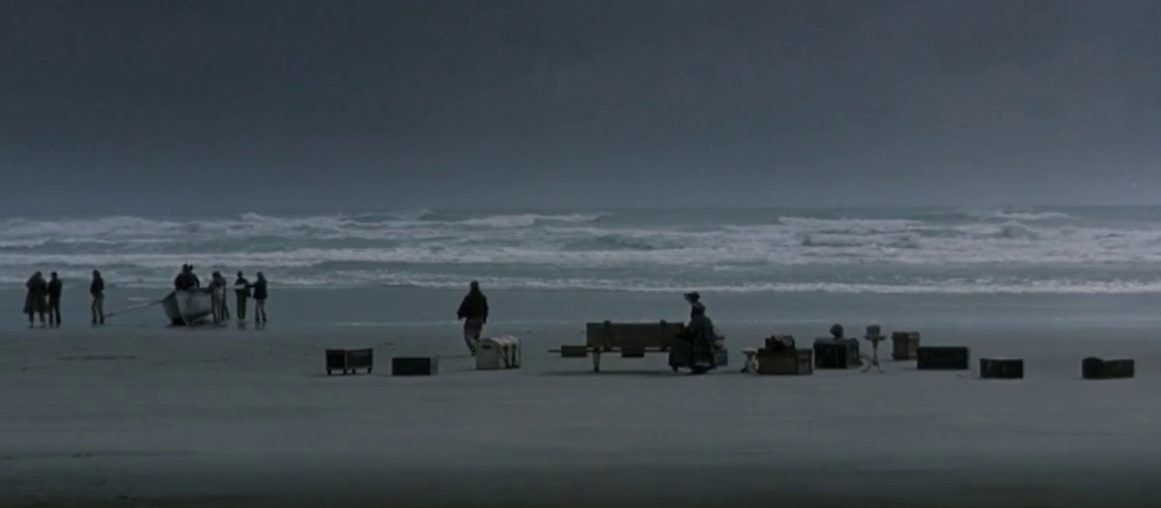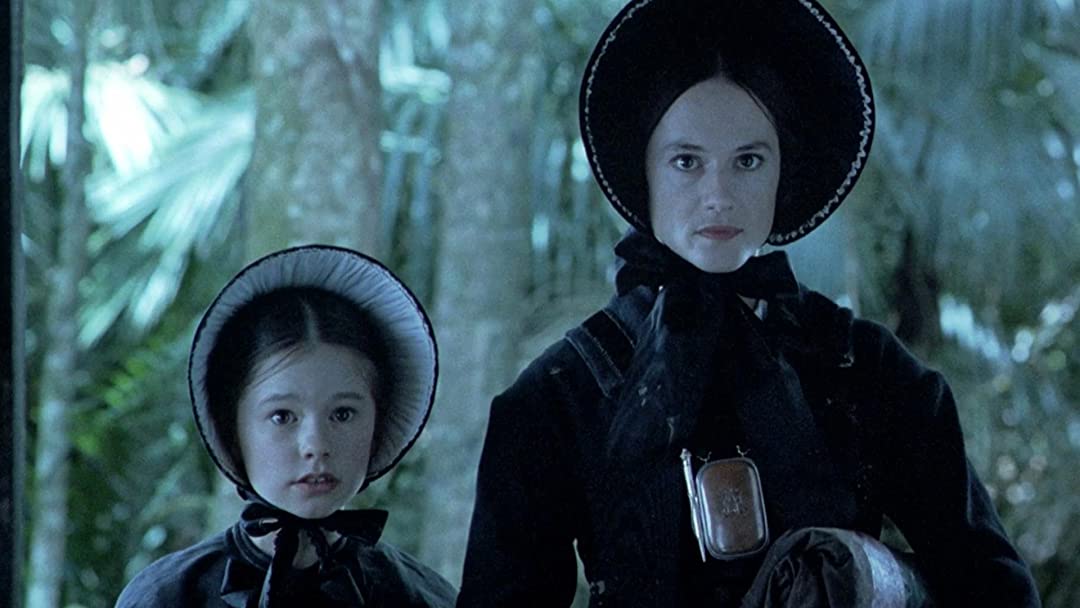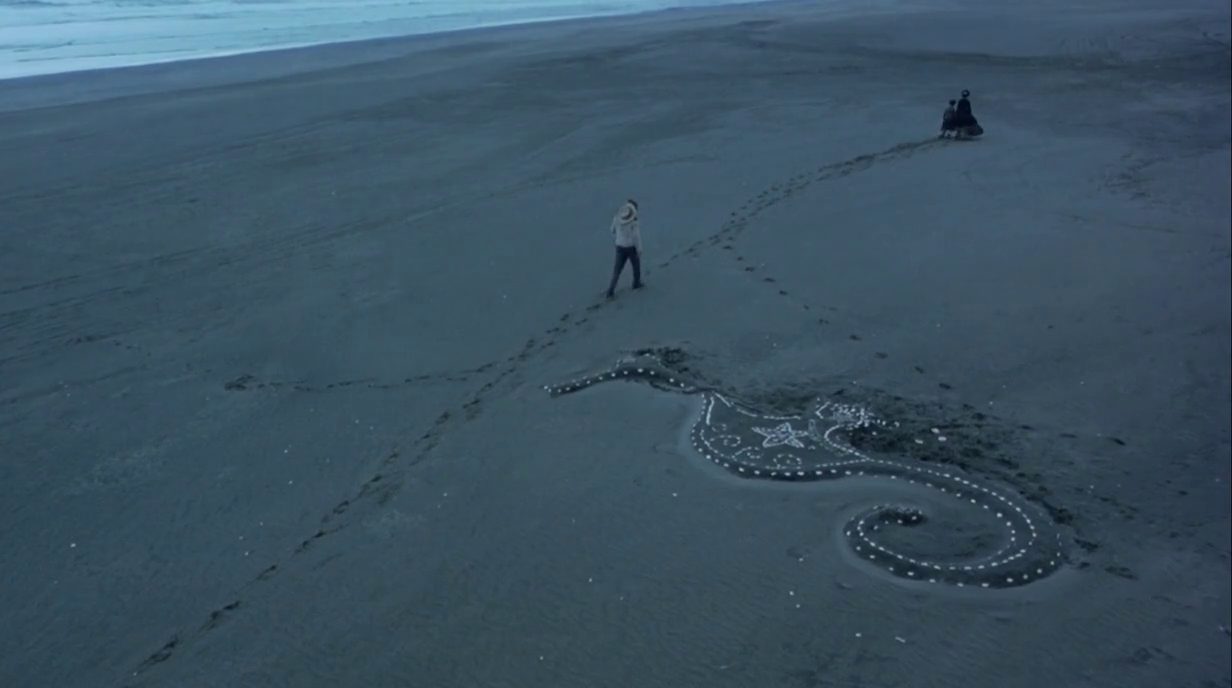

“Down there everything is so still and silent that it lulls me to sleep. It is a weird lullaby and so it is; it is mine.”
Writer-director Jane Campion’s The Piano is one of those love-it-or-hate-it films—some see it as a monumental achievement, while others find it to be a repellent abomination. The praise is clearly warranted in certain regards. For instance, it has a languid, poetic rhythm, boasts a solid period aesthetic, utilizes creative visual metaphors, and is gorgeously lensed by Stuart Dryburgh. The performances from Holly Hunter and Anna Paquin are magnificent. You’ll get no argument from me on those points.
However, in addition to its obvious cinematic merit, it has been lauded for the feminist viewpoint that can be tenuously grafted onto its haunting story of misguided passions. Because most politically-motivated art is second-rate—regardless of which group is being pandered to—The Piano, which both opens the door to in-vogue political conversation and is actually good, has been snatched up, expediently assumed into the canon, and now gets waved around like a manifesto.
Look, I’m perfectly content to accept that Campion enjoys telling morally challenging stories and leave it at that. I’m fine reveling in the lush presentation, committed performances, and peculiar atmosphere that emerges from the millions of tiny decisions that went into making the film. It works perfectly fine as a dark fairytale (it explicity cites Bluebeard within the text) and remains engrossing on those terms. But if one wishes to lean into sexual politics and power dynamics and all that silliness and try to tease some deeper meaning out of it, then we need to clarify what message is available for extraction.

First, the gist of the story. Set in 19th century New Zealand, our tale centers on the elective mute Ada McGrath (Hunter), a mail-order bride who’s been shipped across the sea with her illegitimate daughter Flora (Paquin) to satisfy the marital desires of a British frontiersman named Alisdair Stewart (Sam Neill) who lives among the native Māori. Despite her wordless pleadings, when Stewart and his travelling companions arrive on the stormy beaches to receive his new bride, he elects to leave her bulky piano behind to languish in the abusive elements. If that wasn’t enough to sour their relationship, when it’s finally retrieved he sells it to fellow emigrant George Baines (Harvey Keitel), a retired sailor who has embraced some of the Māori customs, visibly sporting several face tattoos that simultaneously convey danger and romance. But not only does Baines want the piano, he wants Ada as his teacher. Or, to cut to the chase, he wants Ada as his lover. Once alone together in the confines of his abode, he makes her a deal: he’ll pay her one piano key per “lesson” so long as the lesson consists of her playing the piano while he does “things he likes.” And so on and so forth until both Flora and then Alisdair spot the perverse tangle of limbs.

Is this a love story? No. Obviously not. It would be absurd to argue otherwise. You see, prostitution isn’t love. And so it is weird that so many chalk it up as a win for the feminist viewpoint when Ada eventually chooses to abandon her loveless marriage for regular old unpaid sex with Baines like a sufferer of Stockholm Syndrome or something.
Now, there’s no defense for Stewart. He shoots himself in the foot like six times, precluding the possibility of a genuine connection with his new wife, and then throws a hissy fit when she sleeps with another man. He gets so worked up that he tries to rape her. Let’s set that aside because no one really argues that Stewart is morally righteous. However, you will see people defend Baines which is silly. He’s a conniving adulterer who buys sex and makes approximately zero romantic plays. Just “undo your dress,” “lift your skirt,” “I want to lie together without clothes on,” waiting for Stewart’s self-sabotage to work it’s magic. He eventually realizes that “the arrangement is making you a whore, and me, wretched” but does that make him righteous all of a sudden? In a word, no. Just because lustful sex made him feel bad doesn’t mean he’s immediately transformed into a gallant hero. He is not redeemed. Neither does Ada’s choice of the purveyor of her sexual trauma over the purveyor of her physical trauma make him so.

It’s neither here nor there in a film like this, but there are very few situations in which it is even possible to have sex in a “loving” manner with someone you’ve only just met. Incidentally, an arranged marriage is one such case. If you’ve committed yourself to a lifelong relationship with a spouse before the eyes of God and man then go ahead and bone to your hearts’ content. But love is more than just the exercising of a passion, it is consistent righteous action undertaken for the benefit of another. Nothing in this film resembles love, even Ada’s strained relations with her daughter. In both of Ada’s onscreen relationships with men—setting aside the murky past that granted her a child out of wedlock—the passion upon which she operates is not love, but lust. Consider that when she is forbidden from seeing Baines, she’s so lacking in self-control that she hornily goes in for an intimate butt massage on Stewart, the man who she abhors, who lies there in shameful awkwardness. The lack of romance in Baines and Ada’s relationship can be attributed to an incomplete story but I think that Campion simply didn’t intend it to be romantic the way so many people seem to interpret it.
And that’s not to say that any of these moral considerations make the movie good or bad. Simply that disingenuously grafting something onto the text that’s not there is stupid. In reality, it’s the murkiness that makes it so compelling. I’ve not mentioned the dynamics between the European settlers and the natives, the contrast between Stewart’s high society manners and Baines’ rugged demeanor, the implication that Ada is willing to give up her true passion—piano—for love (in however bastardized a form); but those things are all there and all draw the viewer in without resorting to braindead browbeating. It can be fun and uplifting to watch something that reinforces your viewpoint, but the films that stick with you are the ones that are difficult to parse, that get stuck between your teeth and under your skin. Campion’s good at that. If only she’d stuck to her guns and left Ada at the bottom of the sea.